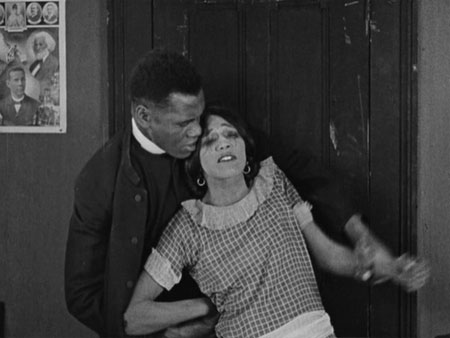Category: Cinema
Reviews of movies Adam has seen or films he has worked on.
A part of this viewing list: Criterion Collection Spine #371: Oscar Micheaux’s Body & Soul and Kenneth MacPherson’s Borderline.
Body & Soul

Paul Robeson and Oscar Micheaux are legendary, so I was eager to see what they could do in collaboration. Body & Soul is Robeson’s first screen appearance, and quite an opening act. The story is about a archetypal hustler who’s hustle happens to involve being an archetypal black preacher. There’s hypocrisy, drunkenness, rape, and murder; just from the preacher! The film is strong throughout, but passes the strength between Robeson’s complete transformation into a Jekyll & Hyde character and Micheaux’s facility with shot selection, cinematography and editing. Body & Soul are typically bound together in mutually positive terms [e.g. Good for body & soul.] but in this film they are opposing forces. An easy analogy can also be made: Robeson as Body; his physical presence completely magnetic. This leaves Soul for Micheaux, who is able to intimate violence with a shot of shoes walking through a door, or an inter-title that simply says “Later.”
The film only fails at the finish line. The dénouement seemed like a grand cop-out to me. For the majority of the film, the drama plays out as an explicit criticism of ministry and an implicit critique of cultural larceny in general. The fact that Micheaux felt the need to end with a “just playin’ y’all” doesn’t indicate a failure of idealism to me, but likely a practical understanding of the reception the film would have gotten with a less fairy-tale conclusion. Nevertheless, I feel like it is fairly well neutered by the last ten minutes, much like Campion’s The Piano was spayed in the same way.
The jazz score for the Criterion release is magnificent. There’s some smooth jazz, acid jazz, chain-ganging, and gospel echoes throughout, many times marvelously juxtaposed to emphasize subtext that an audience used to talkies might typically miss.

• Oscar Micheaux’s Body & Soul: Visual Representation and Social Construction of African-American Identity
• Comprehensive Oscar Micheaux
• Article about the jazz score for the new print.
• YouTube clip of Body & Soul.
Borderline

Borderline is a very different film from Body & Soul. It’s a British avant-garde film about an inter-racial love triangle. Robeson’s role in this film is much less substantive, but no less effective. This effortless efficacy is enabled by the storyline and its inevitable racially-charged confrontation. This film is fairly sophisticated, it uses montage liberally, but in a very refined manner. I’ve never seen a film where completely motionless figures can make a scene feel unutterably violent. When the storm actually comes, it is almost a relief; the subconscious clues supplied by the montage-foreshadowing turn the screen tension into real tension held by the viewer. MacPherson’s use of montage often blends with the action instead of standing separately as a sort of parable like something out of Vertov. Thus, the pop of a champagne cork and the dark stain it leaves on the wall suggests a gunshot and bloodstain, and a woman trimming a hat with shears implies the thoughts of the man playing with a knife in the shot that precedes it.
The jazz score for this film is also very good, but even without it the amount of sound present in the action of this silent film is astounding. Unfortunately the technical aspects of the film are its greatest strength. The plot is probably a bit too complicated to be effectively portrayed in a silent film, and while Robeson’s role is actualized through a single punch, the abrupt ending and nearly non-existent moral would be better suited to a documentary and not a drama. Perhaps this Modern, ambiguous ending was precisely the point, but if there is no particular point to be made, why make a movie that so desperately seems to need one?

• Screenonline synopsis and multimedia. Unfortunately the clips are only available to certain Brits.
• Luxonline History.